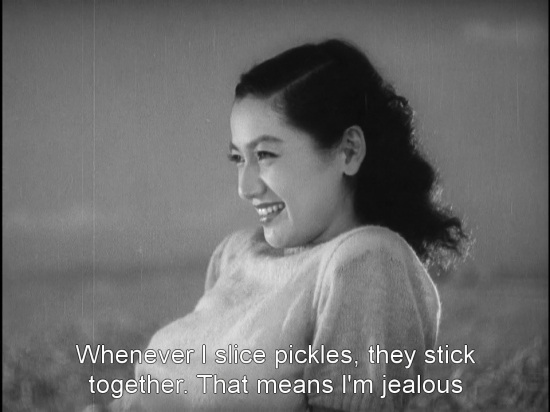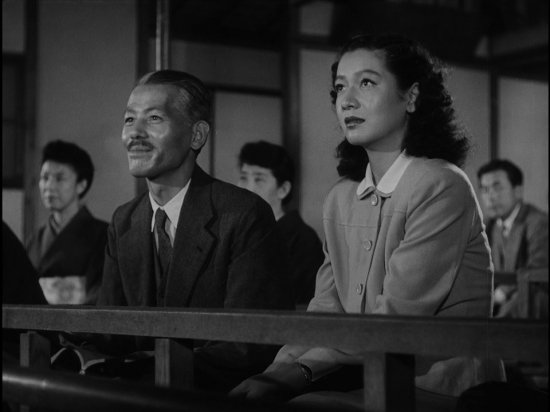
Do you need to be a legendary "Eternal Virgin" to enjoy riding a bike this much? Maybe, since the last person I saw enjoy bike riding this much was Pee-wee Herman. It's not quite as ridiculous when it's the beautiful Setsuko Hara. She, along with director Yasujiro Ozu's excitingly eccentric narrative structure, make a rather ordinary tale rather extraordinary in 1949's Late Spring.
Embodying a certain ideal of virginal purity in 1950s Japan that most modern fans of anime would recognise as enduring to-day, Setsuko Hara enjoyed tremendous success in Japanese cinema. Or she had tremendous success in Japanese cinema; supposedly she hated acting and only did it to support her family. I have to think she chafed at the eternal virgin image a bit. I've enjoyed her in a few roles that directly contradicted this image, but that doesn't mean she's not amazing playing to type in Late Spring. In addition to the genuine feeling her huge, unselfconscious grins seem to imply, there's also a sort of knowing melancholy in her eyes that tempers it--something you don't find in the modern anime house pet virgins.
The title is appropriate--Hara plays Noriko, a twenty seven year old woman who's stayed living at home with her widower father long after the traditionally appropriate marriage age. There's plenty of business in the movie about new, Western cultural conventions infiltrating Japanese society, with people getting divorced and remarried, decent women having sex before they're married. Having lunch with her uncle one day, Noriko laughs as she tells him the fact that he's remarried makes him seem impure and dirty. A great deal of credit goes to Setsuko Hara that she made this interesting rather than a two dimensional caricature of a prude.
There's no condemnation of her uncle, but you can tell she means what she says. Within the first twenty minutes of the film, a very vivid portrait of Noriko comes across as a girl who's allowed herself to become set in her ways, who doesn't criticise others for thinking differently because she's really comfortable with her beliefs.

She goes on the bike ride with a young colleague of her father's, and the two seem to have a mildly flirtatious relationship she seems to feel safe with so long as he has a fiancée. And Noriko ends things when he offers her tickets to a symphony for just the two of them.
She explains to her aunt that she wouldn't think of marrying because her father needs her take care of him. Chisu Ryu as her father also gives an extremely effective performance, as, without any histrionics and with a smile, he sets out to gently convince her that in order to create a proper life for herself she needs to marry now rather than squander her eligible years with him as he spends the last years of his life. It's because we almost never detect any of the real sadness he feels at how lonely he knows he'll be that it's so effective. His face twitches a little when he smilingly lies to her that he plans to remarry. Otherwise, he too is resolute in his philosophy, and accepts what he thinks needs to be done. Her world view and his are pitted against each other and it's his that wins.

Ozu's decisions on how to tell this story are so wonderfully strange. We never even see the man Noriko ends up agreeing to marry halfway through the picture, allowing the focus to be entirely on her relationship with her father. The fiancé's absence from the screen helps convey somehow that there is remarkably little difficulty in the engagement, despite Noriko's inclination to resist. And there are long takes when seemingly nothing essential to the plot happens, as when Noriko and her father view a Noh performance. We see long takes from the performance as well as long looks at Noriko and her father just sitting there, watching with rapt attention. I can't even say exactly why this works, except maybe it's Ozu's almost invariably low angle unmoving camera.

Late Spring, like Tokyo Story and a number of Naruse films that embody mono no aware, is a great expression of the undeniable inadequacy of life to meet our needs and the sort of sad beauty in this.

Oddly, I couldn't help noticing some similarities to Labyrinth, having watched the two films so close together. Both feature a late blooming girl coming of age in one sense or another and breaking free of the influence of a male figure. Every time I watch Labyrinth, it seems more and more to me that the actual mature thing for Sarah to do would be to go with Jareth rather than accept the confines of the supposedly adult world. She misses the fact that he was pleading with her when she says he has no power over her.
Then my random mp3 alarm clock woke me up with Tori Amos' "Winter". Different season, same story. I'm sensing a meme . . .
Twitter Sonnet #320
Secret white stairs function as open black.
I still find lightsabres in the same Sears.
Flee grasping Johnny 5 arms in the back.
Snow ready parrots cry copy ice tears.
Fungus night is cleaned with a paper towel.
Staunching erroneous stars is pink gauze.
Gummy teeth ring the source of a high howl.
Impersonal belts bear lines of boat bras.
Hot Tamales tumble through a glass storm.
Giant eye lashes strain against the wind.
Sewer snails take strange and enormous form.
The fast larvae demand cars to defend.
Crashing blossoms alert the samurai.
Congress din states what the seasons imply.

No comments:
Post a Comment